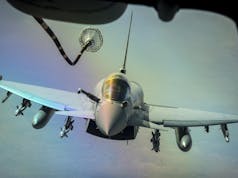Document JDP 0-30 explains the importance of air and space power to UK defence and security, let’s take a brief look.
The doctrine:
- defines air and space power
- explains the attributes of air and space power
- discusses the main roles and functions of UK air and space power
- explains air and space power’s contribution to joint action and the full spectrum approach.
Air power is defined as: the ability to use air capabilities in and from the air, to influence the behaviour of actors and the course of events. UK air power, along with maritime, land, space and cyber power, form the interdependent levers of the military instrument of national power.
Key points regarding air power
• Air power is truly global in nature, as it theoretically enables access to any point on Earth, be it over land or sea.
• Air power offers policy-makers an agile, timely and focussed capability that can be highly effective in resolving or averting a developing crisis.
• As an island nation, the UK relies on its air lines of communication for its prosperity, just as it does its sea lines of communication.
• A broad multinational and multi-agency response involving allies, can provide a wide range of air power options that most nations could not generate independently.
• The North Atlantic Treaty Organization is the cornerstone of UK defence on the global scale and acts as the principal framework for UK operations.
• The fundamental purpose of UK air power is to support the three national security objectives, to help protect, project and promote.
Key points regarding space power
• The exploitation of the attributes and roles of space power provides a significant contribution to the successful employment of joint action.
• The UK Space Agency helps to bring together UK civil and commercial space programmes and interests, and works closely with the UK Ministry of Defence.
• Both the Royal Air Force and Joint Forces Command have close multinational links and are able to request support from the United States and other allied space commands.
• Although collaboration provides opportunities, such as affordable access international space capabilities, there are challenges with regard to classification and data-sharing.
• As part of the collaborative approach, and to maintain space expertise, the UK embeds a number of military staff in multinational space operations centres.
• Satellite services may be transparent or invisible to the end user, but they pervade almost every aspect of joint and combined operations.
• The space environment should be considered as routinely as the other operating environments, and must be included in military planning processes.













“As an island nation, the UK relies on its air lines of communication for its prosperity, just as it does its sea lines of communication.” Yet our air and naval power is weaker than ever…
yeah, but International Aid
Never been weaker than we are now under this government and after successive governments who have cut, cut, cut as if defence and armed forces are an option rather than a necessity.
We need to see some urgency within HMG to the fact they are aware that Royal navy submarine and warship numbers are simply to low to meet current peacetime commitments and that RAF fast jet numbers need to increase via a confirmed commitment to F35B numbers for the strike carriers and a further batch order for Eurofighter typhoon tranche 4 with phased array radars and newest weapons fit. If we have enough F35Bs to man both carriers should the need arise 72 in total and a small OCU and additional contingency reserve of say 1 more squadron. So a total of 96 aircraft in active service then and only then should the RAF be allowed to purchase the A variant. Rejuvenate carrier strike provision must come first as we have already paid for the ships and need to have enough aircraft to fly from them.
Agree. F35B is the priority.
The doctrine is to rely on the USA isn’t it? Otherwise we’d invest more